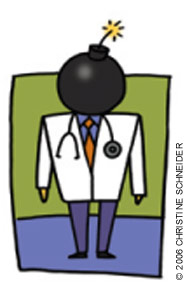
These six steps can help physicians deal with the stress of their profession before it leads to burnout.
Fam Pract Manag. 2006;13(5):86
Dr. Schumer is a family physician practicing in Auburn, Wash. Author disclosure: nothing to disclose.

The stress of being a physician and dealing every day with ailing patients in an ailing health care system can cause even the best of physicians to lose their cool. Over time, physicians battling these pressures can become bitter, angry, anxious or even depressed.
Because physicians typically have a hard time admitting that they have these problems, it's unlikely that anyone reading this article will believe they personally need its advice; however, you may be able to recognize a colleague who is on the brink of decompensation and encourage him or her to take the following steps.
Step one: Get away. Take a weekend off, perhaps even by yourself. Get away from the stresses of the office and home, and go somewhere relaxing, such as the ocean, the mountains, the desert or someplace where you can spend 48 hours reflecting and renewing your mind.
Step two: Seek help. Ask yourself the following question (very quietly, of course): “Could I be depressed?” If the answer is “yes” or even “possibly,” then seek evaluation promptly, preferably by someone skilled in working with physicians. Most state medical societies can direct you to resources. Because confidentiality is so important, you may be more comfortable seeking help outside of your immediate medical community. Whatever you do, don't make the mistake of trying to treat yourself, and don't wait for a functional loss before you seek treatment. Research has found that physicians have higher rates of job impairment than the general public, but this fact is most commonly identified only after patient care is compromised.1
Step three: Manage burnout. As physicians, we commonly advise our patients to take care of themselves but have difficulty following that same advice. Too often, we believe we are somehow immune to the difficulties that beset others. In our training we survived on little sleep and endured 100-hour work weeks, but our willingness to tolerate these factors may make us more susceptible to burnout than the average person, not less. To combat burnout, make it a priority to sleep enough, exercise daily, work reasonable amounts and, most of all, cut yourself some slack.
Step four: Renew your relationships. The older we get, the more closed down we can become. Take some time with your partner and start working on the quality of your relationship. For example, look at some of the research by the Gottman Institute (http://www.gottman.com), and take an inventory of your relationships.
Step five: Re-evaluate your work situation. Some physicians work for organizations that impose unrealistic demands. They treat their employees poorly, and patient care issues may seem secondary to profitability concerns. For example, my ex-boss once pointed to a computer and told me that was the only good thing in the practice of medicine. If, like me, you discover you just can't work for people like that, realize that you do have other options. Family physicians are in high demand, and you can probably find another job in your area or even open your own practice. I have developed an extremely low-overhead, private-practice model that basically allows me to be self-employed.
Step six: Feed your spirit. Dealing with depression, cancer, death and the chronically ill weighs on your spirit. Whether you have religious affiliations or not, you could probably use a little soul rehab. I recommend the writings of Rachel Remen, MD, and of Pema Chodron. In addition, I'd recommend meditation, a staple in all faiths.
These steps can help us stay open and sane and remain good doctors. We are a tough nut to crack, but when we finally do crack, it's pretty messy. The hardest part may be that we are so stubborn. Researchers once asked physicians if they were susceptible to influence by the drug industry. Ninety percent thought other physicians were susceptible, but only 10 percent thought of themselves as susceptible. Aren't you glad you're not one of those 90 percent?